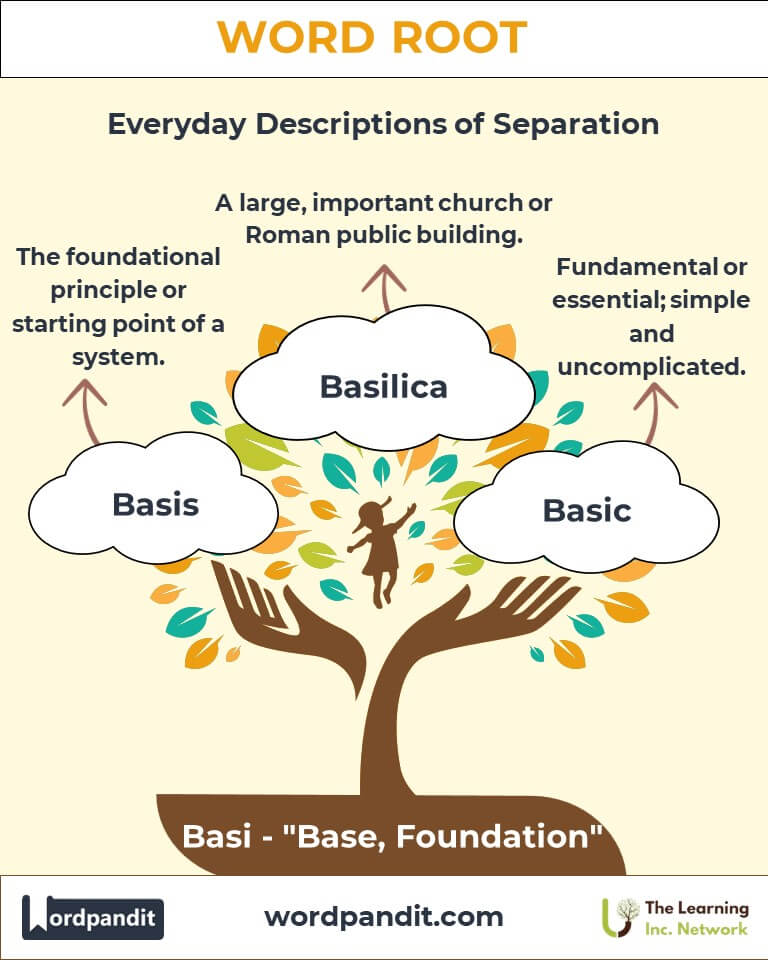Basi: The Foundation of Meaning and Stability
Byline: Discover the significance of the word root "Basi," derived from the Greek and Latin terms for "base" or "foundation." From foundational structures in architecture to core principles in philosophy, "Basi" underpins a vast array of concepts, reflecting its vital role in language and thought.

Table of Contents
- Introduction: The Essence of "Basi"
- Etymology and Historical Journey
- Mnemonic: Unlocking the Power of "Basi"
- Common "Basi"-Related Terms
- "Basi" Through Time
- "Basi" in Specialized Fields
- Illustrative Story: "Basi" in Action
- Cultural Significance of "Basi"
- The "Basi" Family Tree
- FAQs about the "Basi" Word Root
- Test Your Knowledge: "Basi" Mastery Quiz
- Conclusion: The Enduring Legacy of "Basi"
1. Introduction: The Essence of "Basi"
The root "Basi" (pronounced BAY-see or BAH-see) forms the backbone of words that denote foundational elements. Derived from the Greek "basis" (base or pedestal) and Latin "basis," this root signifies something fundamental or essential. In disciplines ranging from science to philosophy, "Basi" highlights the importance of beginnings, bases, and core principles.

2. Etymology and Historical Journey
The root "Basi" has deep linguistic roots, stemming from the Greek word "basis," meaning "step" or "foundation," and its Latin counterpart, which retains a similar meaning. Historically, it was used to describe physical structures such as pedestals or bases of statues. Over time, it evolved into abstract concepts, representing fundamental principles or the starting points of systems.
3. Mnemonic: Unlocking the Power of "Basi"
To remember "Basi," picture a sturdy foundation of a towering building, symbolizing stability and support. Think of it as the essential base upon which everything else rests.
"Basi is the base of brilliance—where everything begins."
4. Common "Basi"-Related Terms
- Basilar (BAH-sih-lar): Pertaining to or situated at the base, especially in anatomy.
Example: "The basilar artery supplies blood to vital brain regions." - Basic (BAY-sik): Fundamental or essential; simple and uncomplicated.
Example: "Understanding basic principles is key to mastering any subject." - Basilica (buh-SIL-ih-kuh): A large, important church often built with a central nave.
Example: "The Basilica of St. Peter in Rome is a marvel of architecture." - Basement (BAYS-ment): A lower level of a building, often used for storage.
Example: "The basement was transformed into a cozy living space." - Basilisk (BA-sil-isk): A mythical creature said to cause death with a single glance.
Example: "Legends describe the basilisk as the king of serpents."
5. "Basi" Through Time
Basilica: Originally a Roman public building for courts and gatherings, now denotes grand churches with ceremonial privileges.
Basilar: Initially used in anatomy to describe the base of the skull, now widely applied in neuroscience and surgery.
6. "Basi" in Specialized Fields
- Medicine: Basilar artery supplies blood to the brainstem and cerebellum, vital for understanding strokes.
- Architecture: Basements form the foundational structure of buildings, essential for structural integrity.
- Philosophy: Basic principles refer to foundational truths central to logical and ethical frameworks.
7. Illustrative Story: "Basi" in Action
Dr. Elena Martinez, a neurologist, worked tirelessly to save a patient suffering from a basilar artery blockage. Using advanced imaging and surgical techniques, she restored blood flow, showcasing the critical role of understanding foundational anatomy in life-saving procedures. Her dedication reminded her students that a strong grasp of basic principles is the foundation of success.
8. Cultural Significance of "Basi"
The root "Basi" underscores humanity’s reverence for foundations, both literal and metaphorical. From the architectural wonders of ancient basilicas to philosophical treatises on basic truths, "Basi" reflects the universal importance of building upon solid ground.

9. The "Basi" Family Tree
- Base: The bottom or foundation. Example: "The base of the statue was beautifully carved."
- Fund (Latin, 'bottom'): Basis of support. Example: "Funding is essential for research."
- Sub (Latin, 'under'): Implies beneath or foundational. Example: "Substructure refers to the supporting part of a building."
10.FAQs About the Basi Word Root
Q: What does "Basi" mean?
A: The root "Basi" means "base" or "foundation," originating from the Greek "basis" and Latin "basis."
Q: How is "Basi" used in medicine?
A: In medicine, "Basi" appears in terms like "basilar artery," which supplies blood to vital brain regions.
Q: What does the term "Basilica" refer to?
A: A Basilica is a large, important church often built with a central nave, originally a Roman public building.
Q: What is the cultural significance of "Basi"?
A: "Basi" reflects humanity’s reverence for foundational structures, both literal and metaphorical, such as basilicas and basic principles.
Q: Is "Basi" used in philosophy?
A: Yes, it appears in "basic principles," referring to foundational truths or axioms central to logical frameworks.
11.Test Your Knowledge: Basi Word Root Quiz
1. What does the root "Basi" mean?
2. What does "Basilar artery" supply?
3. What was the original function of a Basilica?
4. Which field uses "Basi" for foundational truths?
5. What does "Basilisk" signify?

12. Conclusion: The Enduring Legacy of "Basi"
The root "Basi" remains a cornerstone of language and meaning. From medicine to architecture, its applications highlight the universal need for strong foundations. As new ideas and structures emerge, "Basi" will continue to remind us of the importance of building on stable ground.













